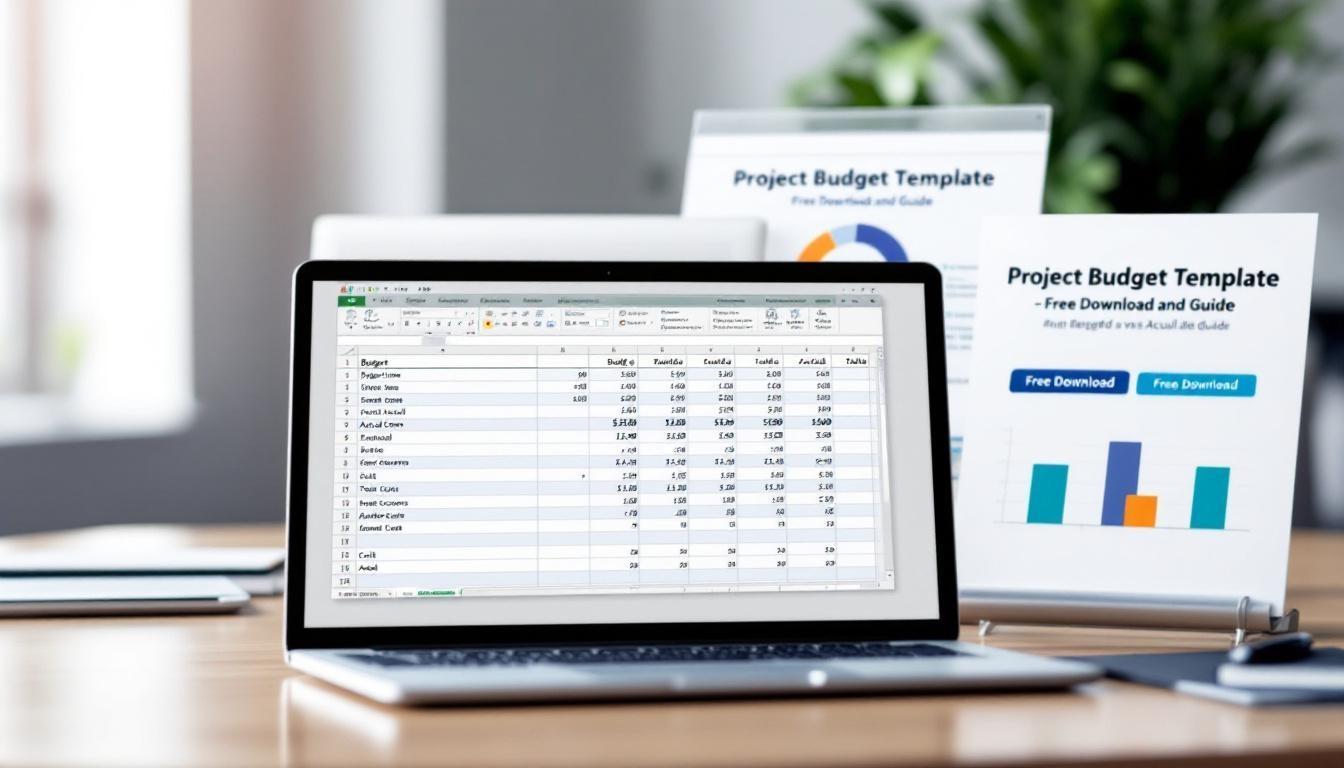
At adding technology, we understand the challenges construction companies face in managing their workforce efficiently.
Construction time cards are a powerful tool for improving project tracking, ensuring compliance, and boosting productivity.
In this post, we’ll guide you through implementing an effective time card system that streamlines your operations and enhances financial management.
Construction time cards form the foundation of effective project management and financial control in the construction industry. Time cards provide a detailed record of hours worked on specific tasks, which enables accurate project tracking. This level of detail allows project managers to identify bottlenecks, allocate resources more effectively, and make data-driven decisions. The insights gained through advanced analytics in construction projects can help to improve efficiency, timelines, and risk management.
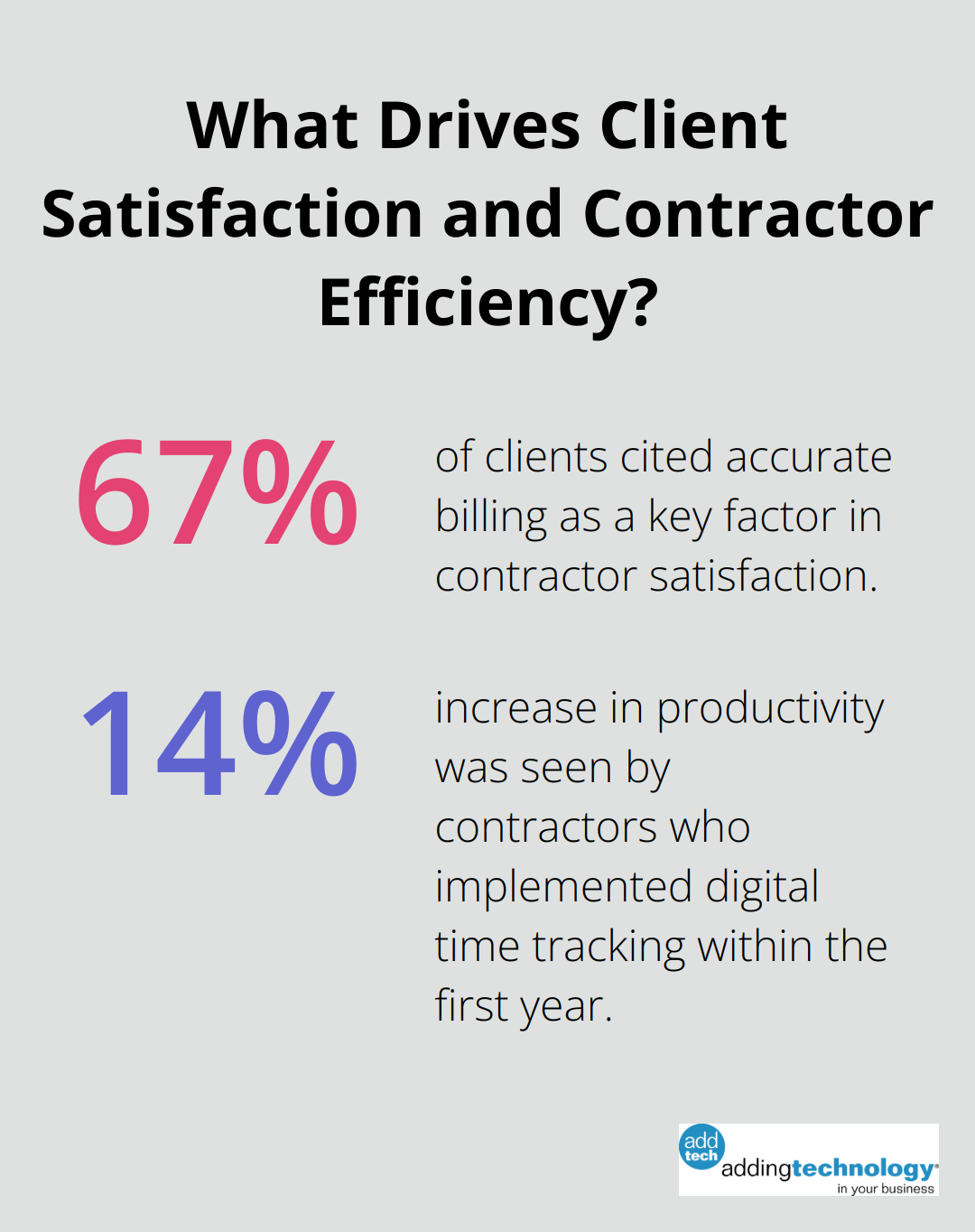
Precise time records translate directly to accurate invoices when it comes to billing. This not only ensures fair compensation for work but also builds trust with clients. A survey by the National Association of Home Builders revealed that 67% of clients cited accurate billing as a key factor in contractor satisfaction.
In the complex world of construction regulations, time cards serve as an essential tool for compliance. They provide a clear audit trail of employee hours, overtime, and breaks. The U.S. Department of Labor reports that wage and hour violations in the construction industry resulted in over $32 million in back wages in 2020 alone. A robust time card system can significantly reduce the risk of such costly violations.
Time cards offer valuable insights into how companies use time and resources across projects. Analysis of this data helps companies identify areas for improvement and optimize their workflows. A case study by the Associated General Contractors of America showed that contractors who implemented digital time tracking saw a 14% increase in productivity within the first year.
Moreover, time cards help in forecasting future project needs. Understanding how long specific tasks typically take allows for more accurate estimates for upcoming projects. This leads to better resource allocation and potentially higher profit margins.
In the competitive construction landscape, every minute counts. Effective time card implementation isn’t just about tracking hours-it provides a competitive edge through data-driven decision-making and operational excellence.
Time cards enable construction companies to:
The next step in maximizing the benefits of construction time cards involves choosing the right system for your company’s specific needs. Let’s explore the options available and how to select the most suitable solution for your construction business.
The construction industry has moved beyond paper-based systems. Digital time card solutions offer significant benefits in efficiency and accuracy. St. Andrews Construction reduced payroll processing time by nearly 60% by using Rhumbix’s time and labor tracking. This time savings allows teams to focus on more value-adding activities.
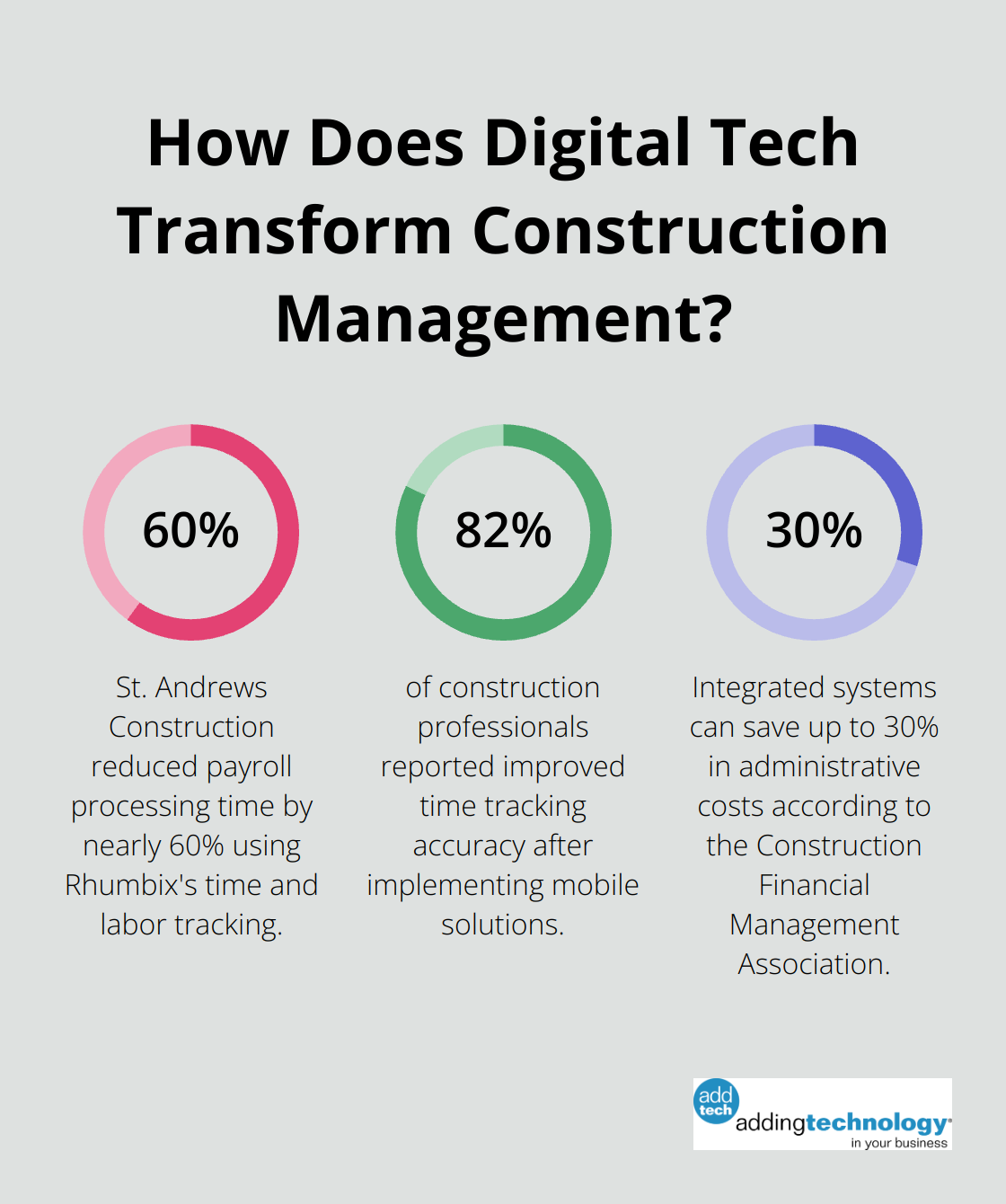
Digital systems provide real-time data access, which enables quick decision-making and problem-solving. Project managers can identify if a task takes longer than estimated and adjust resources immediately.
In the dynamic environment of a construction site, mobility is key. Mobile app solutions for time tracking have gained popularity due to their convenience and accuracy. A survey by Software Advice found that 82% of construction professionals reported improved time tracking accuracy after implementing mobile solutions.
These apps often include GPS tracking (ensuring employees are on-site when they clock in) and allow for easy task allocation and progress updates. This provides a comprehensive view of project status.
When you select a time card system, consider how it will integrate with your existing software ecosystem. A system that connects seamlessly with your accounting software can eliminate double data entry and reduce errors. The Construction Financial Management Association reports that integrated systems can save up to 30% in administrative costs.
Try to find solutions that offer API connections or direct integrations with popular construction accounting software. This integration not only saves time but also provides a more holistic view of your project finances.
Every construction company has unique needs. The ideal time card system should offer customization options to fit your specific workflows and reporting requirements. It should also scale with your business as it grows, accommodating more users, projects, and data without compromising performance.
Data security is paramount in today’s digital landscape. Look for time card systems that offer robust security features such as encryption, secure data storage, and user authentication. The system should also help you comply with labor laws and regulations by accurately tracking overtime, breaks, and other relevant data.
As you evaluate different time card systems, consider how they align with your company’s specific needs and future growth plans. The right choice will significantly improve your efficiency, accuracy, and financial control. Now, let’s explore how to implement these systems effectively in your construction business.
The foundation of effective time card usage lies in thorough employee training. The Construction Industry Institute identifies industry trends and norms, allowing companies to compare their performance to industry standards. Create a detailed training manual covering all aspects of your chosen time card system. Include step-by-step instructions, troubleshooting tips, and best practices.
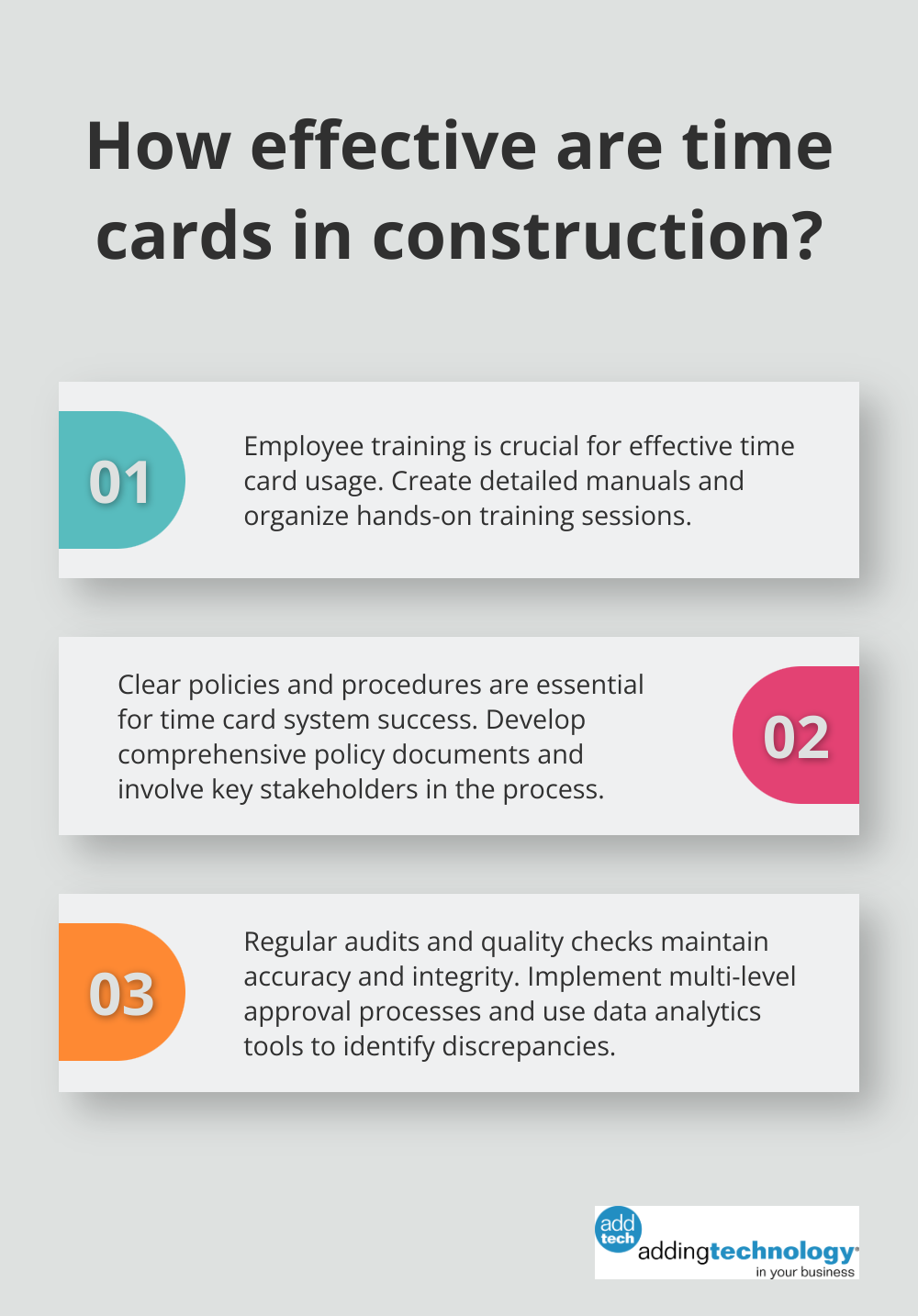
Organize hands-on training sessions where employees practice using the system in a controlled environment. Appoint “time card champions” within each team to provide ongoing support and answer questions. These champions act as a bridge between management and workers, helping to identify and address issues quickly.
Well-communicated policies are essential for the success of any time card system. Develop a comprehensive policy document that outlines expectations, procedures, and consequences for non-compliance. Address common issues such as late submissions, missed clock-ins, and overtime approval processes.
Involve key stakeholders (including project managers, HR representatives, and legal advisors) in the policy development process. This ensures coverage of all aspects of time tracking and alignment with company goals and legal requirements.
Communicate policies clearly to all employees. Create a quick-reference guide highlighting key points, easily accessible on job sites. Send regular reminders and updates about time card policies to maintain compliance over time.
Periodic reviews of time card data are vital for maintaining accuracy and integrity. Establish a schedule for audits, looking for patterns or anomalies that might indicate issues. A recent study found that offices with higher pay disparity are associated with certain audit adjustments.
Implement a multi-level approval process where supervisors review and approve time cards before sending them to payroll. This adds an extra layer of accuracy and accountability. Use data analytics tools to identify trends or discrepancies that might not be apparent through manual review.
Collect feedback from employees about the time card system regularly. Their insights prove invaluable in identifying areas for improvement and ensuring the system meets everyone’s needs. Use surveys, focus groups, or one-on-one discussions to gather this information.
Analyze the feedback and implement necessary changes to improve the system’s usability and effectiveness. This continuous improvement process helps to maintain employee buy-in and ensures the time card system remains relevant and efficient as your company grows.
Try to integrate your time card system with other construction management tools (such as project management software or accounting systems). This integration streamlines data flow and reduces the risk of errors from manual data entry. Adding Technology offers expert services in this area, ensuring seamless integration of time card systems with your existing software ecosystem.
Construction time cards revolutionize project management and financial control in the construction industry. Companies that implement robust time card systems achieve precision in project tracking, ensure labor law compliance, and boost productivity through optimized resource allocation. Digital solutions, especially those with mobile capabilities, offer unparalleled advantages in accuracy and efficiency for construction businesses.
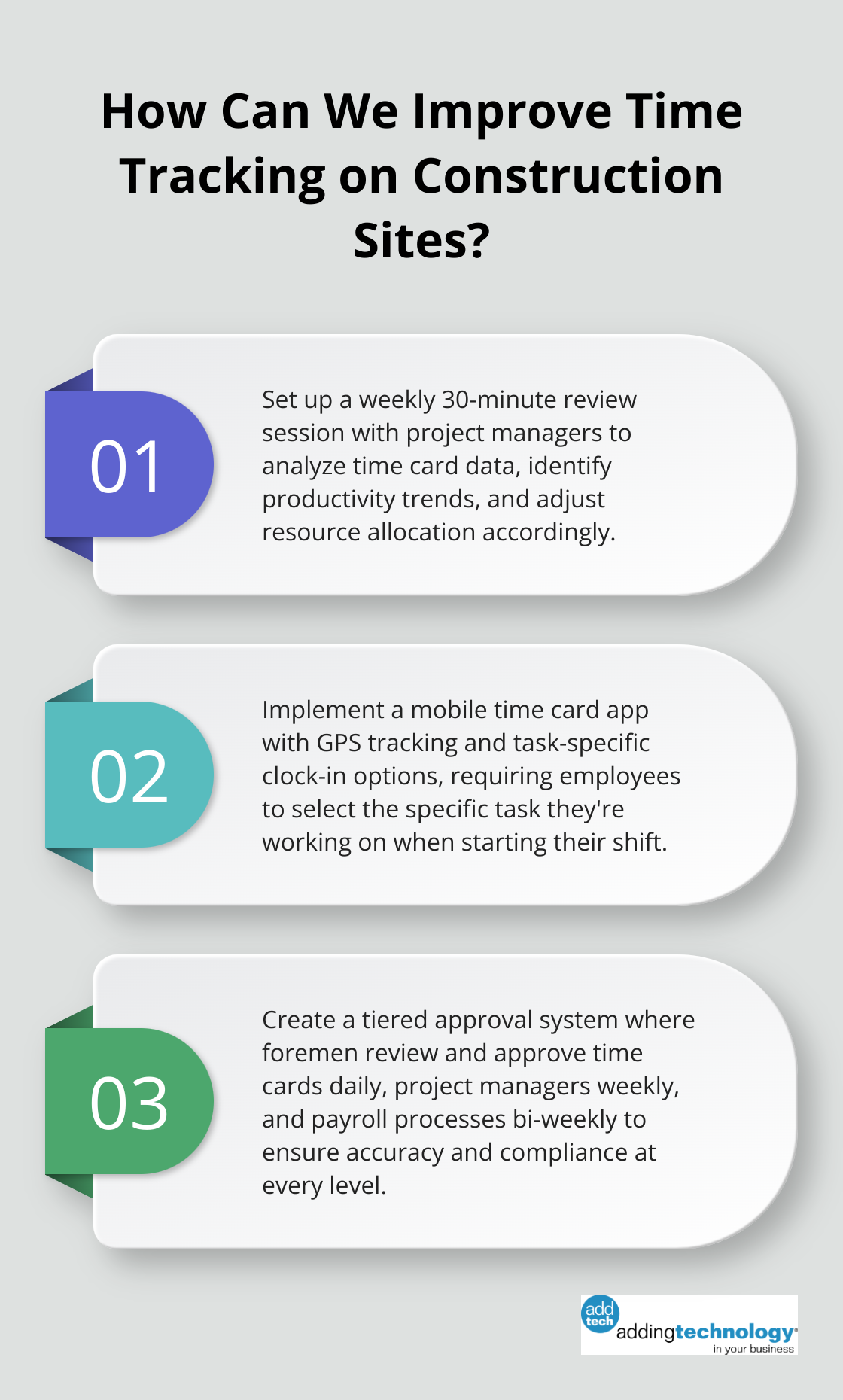
Successful implementation of construction time cards requires comprehensive employee training and clear policies. Regular audits and employee feedback contribute to high adoption rates and continuous improvement of time tracking practices. The impact of effective time card management extends beyond simple hour tracking, providing valuable data for decision-making and improving project estimations.
Construction companies that want to elevate their financial management and streamline operations can benefit from expert services. Adding Technology offers tailored solutions to meet the unique needs of the construction industry. Their approach to integrating advanced time tracking solutions helps construction businesses build a solid financial foundation and focus on delivering outstanding projects.









At adding technology, we know you want to focus on what you do best as a contractor. In order to do that, you need a proactive back office crew who has financial expertise in your industry.
The problem is that managing and understanding key financial compliance details for your business is a distraction when you want to spend your time focused on building your business (and our collective future).
We understand that there is an art to what contractors do, and financial worries can disrupt the creative process and quality of work. We know that many contractors struggle with messy books, lack of realtime financial visibility, and the stress of compliance issues. These challenges can lead to frustration, overwhelm, and fear that distracts from their core business.
That's where we come in. We're not just accountants; we're part of your crew. We renovate your books, implement cutting-edge technology, and provide you with the real-time job costing and financial insights you need to make informed decisions. Our services are designed to give you peace of mind, allowing you to focus on what you do best - creating and building.
Here’s how we do it:
Schedule a conversation today, and in the meantime, download the Contractor’s Blueprint for Financial Success: A Step by-Step Guide to Maximizing Profits in Construction.” So you can stop worrying about accounting, technology, and compliance details and be free to hammer out success in the field.